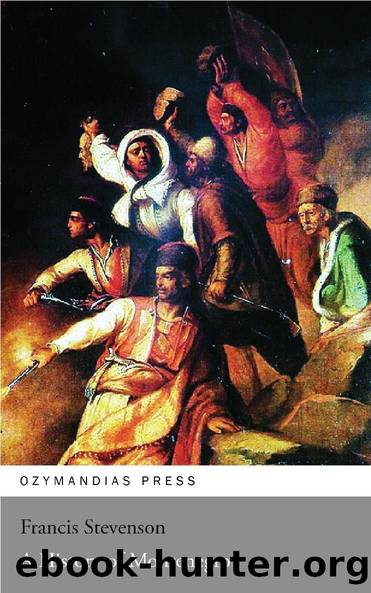A History of Montenegro by Francis Stevenson

Author:Francis Stevenson
Language: eng
Format: epub
Publisher: Ozymandias Press
CHAPTER III.
~
THE OFFICE OF VLADIKAâCHARACTERISTIC FEATURES of Montenegroâs ecclesiastical history viewed in connection with that of the Eastern Church.
The constitutional change by which the office of Vladika was made virtually hereditary in the family of Danilo Petrovic Njegus, affords a favourable opportunity for examining the origin and nature of that remarkable institution; and such an enquiry necessarily involves some account of the Montenegrin Church as a whole, and in its relation to the remainder of the Eastern Church.
The word Vladika meant originally a powerful person, or ruler, and appears to have been connected with the headship of the House Communities. Traces of that signification may be found in its use, at the time of the Nemanjids, as the equivalent of the Byzantine word despotes, and in several Slavonic languages, as for example in Czech, it has preserved unimpaired its original signification. Among the Serbs, however, it was gradually specialized, and came to denote a bishop. The title of Vladika, which belonged to the rulers of Montenegro from the commencement of the sixteenth century until the year 1851, though used in the Serbian sense of the word, may be said to unite in itself the notion of secular power with that of episcopal rank in the ecclesiastical hierarchy. The position of the Vladikas of the Crnagora has been compared, from a constitutional point of view, to that of the Popes of Rome, with their combination of spiritual with temporal power; and the resemblance is certainly remarkable in the case of those who ruled from the time of Vavil to that of Sava Ocinic, the predecessor of Danilo. The following difference should, however, be noted. The power of the Popes was primarily spiritual, and it was only incidentally that they became temporal sovereigns. The Vladikas, on the other hand, were bishops because they were princes, not princes because they were bishops. This was so especially during the last century and a half of their rule. The episcopal dignity was with them little more than an inseparable accident. And although the existence of a civil governor would seem, at first sight, to militate against this view, it should be remembered that he was in reality a mere agent to whom the Vladika delegated the non-ecclesiastical portion of his power, and from whom he was always at liberty to require its resignationâas was actually the case in 1832, when Peter II abolished altogether the subordinate office.
Another remarkable feature in the rule of the Vladikas is the hereditary character which it may be said to have acquired under Danilo, and to have retained until the middle of the nineteenth century. That hereditary character furnishes a proof of the subordination of the spiritual to the temporal element in the office. As it was, the system gave rise to considerable practical difficulties. By the rules of the Orthodox Church, although the lower clergy are allowed, and in some countries, such as Russia, compelled to marry, celibacy is incumbent upon the upper ranks of the hierarchy. Consequently the Vladika was necessarily succeeded by his nephew or by some other near relation.
Download
This site does not store any files on its server. We only index and link to content provided by other sites. Please contact the content providers to delete copyright contents if any and email us, we'll remove relevant links or contents immediately.
| Africa | Americas |
| Arctic & Antarctica | Asia |
| Australia & Oceania | Europe |
| Middle East | Russia |
| United States | World |
| Ancient Civilizations | Military |
| Historical Study & Educational Resources |
Magic and Divination in Early Islam by Emilie Savage-Smith;(1533)
Papillon by Henry Charrière(1423)
Bohemians, Bootleggers, Flappers, and Swells: The Best of Early Vanity Fair by Bohemians Bootleggers Flappers & Swells- The Best of Early Vanity Fair (epub)(1394)
Ambition and Desire: The Dangerous Life of Josephine Bonaparte by Kate Williams(1383)
Twelve Caesars by Mary Beard(1313)
Operation Vengeance: The Astonishing Aerial Ambush That Changed World War II by Dan Hampton(1155)
What Really Happened: The Death of Hitler by Robert J. Hutchinson(1154)
London in the Twentieth Century by Jerry White(1145)
The Japanese by Christopher Harding(1130)
Time of the Magicians by Wolfram Eilenberger(1125)
Twilight of the Gods by Ian W. Toll(1113)
Lenin: A Biography by Robert Service(1073)
The Devil You Know by Charles M. Blow(1023)
A Social History of the Media by Peter Burke & Peter Burke(968)
Freemasons for Dummies by Hodapp Christopher;(963)
Napolean Hill Collection by Napoleon Hill(936)
Henry III by David Carpenter;(919)
The Rise and Triumph of the Modern Self by Unknown(911)
The Churchill Complex by Ian Buruma(906)
